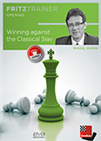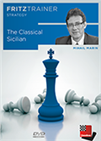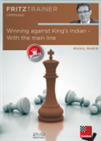MMMG #10: Optimal form
 Mihail Marin was born in Bucharest on 21 April 1965. A multiple Romanian champion, his first major international success was achieved in 1987 when he qualified to the Interzonal Tournament played in Szirák. Three years later, he played at the Interzonal in Manila. In 1988, Marin won the bronze medal on board 3 at the Thessaloniki Olympiad — that was the first of twelve Olympiads in which he represented Romania, the last one so far being Baku 2016.
Mihail Marin was born in Bucharest on 21 April 1965. A multiple Romanian champion, his first major international success was achieved in 1987 when he qualified to the Interzonal Tournament played in Szirák. Three years later, he played at the Interzonal in Manila. In 1988, Marin won the bronze medal on board 3 at the Thessaloniki Olympiad — that was the first of twelve Olympiads in which he represented Romania, the last one so far being Baku 2016.
For many years, Marin worked as a second of Judit Polgar, and in 2005 he accompanied the Hungarian star to three elite tournaments, including the San Luis World Championship.
Besides being a strong player, Marin has written a number of well-received books. Learn from the Legends was named the 2005 ChessCafe Book of the Year, while Secrets of Chess Defence was nominated for the 2003 ChessCafe Book of the Year, just to name two of his biggest successes. Jeremy Silman, also a well-known author, wrote of Learn from the Legends: “I can’t recall having seen a better book in the last two decades”.
In a lengthy interview with the Romanian grandmaster after he won the ChessCafe Book of the Year award in 2005, the then 40-year-old was asked whether he planned to fully devote to his career as a writer and teacher. Marin responded:
 The videos on this DVD give White a repertoire with concrete variations against all main lines Black can play and also show the typical strategic and tactical ideas of the Slav and the hidden subtleties of the position.
The videos on this DVD give White a repertoire with concrete variations against all main lines Black can play and also show the typical strategic and tactical ideas of the Slav and the hidden subtleties of the position.
Time and human resources are so awfully limited that I haven’t managed yet to entirely adapt myself to the dual character of my professional activity. I achieve the best results (in both fields!) when I manage to induce in myself the psychological approach of an amateur: the pure pleasure of practising my hobbies without any concrete purpose. However, it can also happen that I work on a book longing for the next tournament to come or, on the contrary, to ruin a well started tournament just because I bear in mind so many things to write.
Taimanov wrote that whenever he plays chess he relaxes from playing the piano and vice versa, adding that this allowed him to have a never-ending vacation. He must have had a very happy life. This is the state of mind I would dream of.
The Romanian is very much an active player still. In fact, he is currently playing the Benasque International Open in the heart of the Pyrenees.
Marin has authored or collaborated with more than 30 ChessBase FritzTrainers.

Photo: Andreas Kontokanis
Played at the 1996 Chess Olympiad in Yerevan, Marin’s most memorable game was a sharp struggle against Belarusian GM Aleksej Aleksandrov.
Marin, Mihail vs. Aleksandron, Aleksej
Chess Olympiad, 1996 - Yerevan
How could chess players, be they professionals or amateurs, ensure reaching the best form during a tournament? Many generations of players and trainers have concerned themselves with this critical tension, but as far as I know, nobody has given a 100% valid answer yet.
You sit down for your first round game, hoping for the best and trying hard not to think of the worst. You must be aware of the fact that only a few rounds later, or maybe just after the end of the tournament, you will be able to find out whether you were in optimal form or not. I have since ever tried to train my mind before the tournaments by solving tactical puzzles, and this method usually gave good results.
 This DVD offers Black a complete repertoire against all weapons White may employ on move six. The recommended repertoire is not as risky as other Sicilians but still offers Black plenty of counter-play.
This DVD offers Black a complete repertoire against all weapons White may employ on move six. The recommended repertoire is not as risky as other Sicilians but still offers Black plenty of counter-play.With the passing of the years, I have discovered that in order to play tournaments and games I could be really proud of, one more ingredient, which I could not control, was necessary: I needed to feel well in the city or resort hosting the tournament. Judging from several points of view, the Yerevan 1996 Olympiad was anything but the optimal environment. Our hotel (was it called Yerebuny?!) was modest, and most of my teammates considered the food to be absolutely awful.
Personally, I did not feel anything of that. After having served in the army, I cannot be so easily scared about such details. Following the presidential elections and the ensuing failed putsch, tanks and soldiers invaded the streets and one could hear shootings and cries during the night. It was a bit weird, of course, but it also added a bit of excitement. I remember that I wanted to take a photo of the nicely aligned tanks in the central square, when a soldier indicated that I should not.
On top of that, I had a permanent headache during the first half of the tournament. The travel had been long and tiring and there might have been some mystic influence of the Ararat mountain, the place where Noah’s Ark had landed long, long time ago. Despite all these factors, I greatly enjoyed my participation in this Olympiad. A quarter of a century has passed, so my memories are not so vivid any more, but I believe that I was touched by the
people’s kindness and warmth, and the fact that I was permanently curious about the culture of this small and remote country.
In short, the place offered me the best environment — it made me feel like in a genuine love story with the city and its people. I started with two wins and after a day off I drew with black against Michael Adams. I remember how amused I was during that game, noticing that my opponent’s rating was 155 points higher than mine. During my numerous opens, I usually got the reversed situation!

China’s Ye Jiangchuan facing Russia’s Vladimir Kramnik at the 1996 Olympiad | Photo: Rosa de las Nieves
 In the classical system of the King's Indian White develops naturally and refrains from chasing ghosts looking for a refutation of Black's set-up. White instead relies on the fact that natural play should yield him a small but lasting advantage.
In the classical system of the King's Indian White develops naturally and refrains from chasing ghosts looking for a refutation of Black's set-up. White instead relies on the fact that natural play should yield him a small but lasting advantage.In the fifth round, we faced the strong team of Belarus, with Boris Gelfrand on top board. On the second board, I was playing against a very talented and strong young player, Aleksej Aleksandrov. Some of my colleagues took good care to scare me in regard to the “beast” I was going to play against.
Things developed my way and I managed to win a beautiful game. A friend of mine, belonging to the world’s elite in those years, congratulated me and said that he thinks this would be the best game of the whole Olympiad!
Towards the end of the tournament, I found out that there was a contest for the best three games, rewarded by the Armenian president Levon Ter Petrosian with 4000, 2000 and 1000 US dollars respectively. I quickly annotated the game — handwritten on paper — and handed it to the coordinator of the contest, the legendary grandmaster Eduard Gufeld. I vividly
remember the scene. Gufeld, who was eating a huge sandwich, used his free hand to take my paper and crumple it while carelessly putting it in one of his pockets.
I did not have big expectations after that episode, but one year later, the results of the contest were announced: my game was awarded with the second prize! I was very pleased, of course, both sentimentally and financially, but was annoyed by a small detail. My aforementioned friend, who was part of the jury, did not award any point to my win! I do not know what made him change his mind, but had he placed it even on the third place in his evaluation, I would have got the first prize!
The aim of these Dvd's is to build a repertoire after 1.c4 and 2.g3 for White. The first DVD includes the systems 1...e5, the Dutch and Indian setups. The second DVD includes the systems with 1...c5, 1...c6 and 1...e6.
Links


















 Mihail Marin was born in Bucharest on 21 April 1965. A multiple Romanian champion, his first major international success was achieved in 1987 when he qualified to the
Mihail Marin was born in Bucharest on 21 April 1965. A multiple Romanian champion, his first major international success was achieved in 1987 when he qualified to the 




